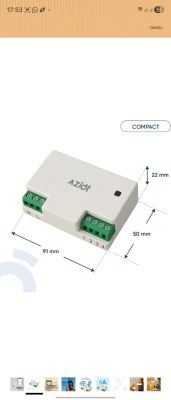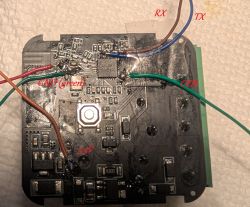Hi,
I have a model of a remote controlled excavator. The original control doesn't work, it's time to build my own.
I would like to base this project on some dev board with ESP32. The problem is the number of motors vs the number of GPIOs available on the board.
I need to control at least six DC motors, plus make some switches (like turn on lights/diodes etc). Three of the motors have hall sensor limiters. To control the motors, some simple H-bridges will probably suffice, just that I need at least 2 pins per motor (depending on the bridge used 2 PWM, or 1 PWM one direction or even 3 pins) plus for the motors from the limiters two more pins each.
I will definitely exceed the number of GPIOs available. There was an idea to look for GPIO extenders, or better still bridges with communication over I2C. However, I have not been able to find either the first or the second solution very well. I'm interested in ready-made boards/modules, I don't want to play with designing a board. We are rather talking about cheap modules, a few zlotys for a bridge, 1-2(A) per motor.
Another idea was to use two boards with ESP32 and communicate between them. Here, the problem will already be to pack everything in a housing.
The control signal will come from the FlySky FS-iA6B receiver over the i-bus.
I would be grateful for any ideas!
I have a model of a remote controlled excavator. The original control doesn't work, it's time to build my own.
I would like to base this project on some dev board with ESP32. The problem is the number of motors vs the number of GPIOs available on the board.
I need to control at least six DC motors, plus make some switches (like turn on lights/diodes etc). Three of the motors have hall sensor limiters. To control the motors, some simple H-bridges will probably suffice, just that I need at least 2 pins per motor (depending on the bridge used 2 PWM, or 1 PWM one direction or even 3 pins) plus for the motors from the limiters two more pins each.
I will definitely exceed the number of GPIOs available. There was an idea to look for GPIO extenders, or better still bridges with communication over I2C. However, I have not been able to find either the first or the second solution very well. I'm interested in ready-made boards/modules, I don't want to play with designing a board. We are rather talking about cheap modules, a few zlotys for a bridge, 1-2(A) per motor.
Another idea was to use two boards with ESP32 and communicate between them. Here, the problem will already be to pack everything in a housing.
The control signal will come from the FlySky FS-iA6B receiver over the i-bus.
I would be grateful for any ideas!






